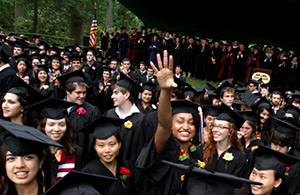
Magill's 100 Rules
In 1883, the College's second president Edward Magill issued a strict code of conduct to govern students, known as the "100 rules." They stand in stark contrast to the Swarthmore Bucket List of 150 things that resonate with current and past students to do before graduation. The Rules reflect the founders' interest in providing discipline and a guarded education to Swarthmore students, although they were liberalized to attract more students near the end of Magill's tenure as president in 1889.Laws Applicable to College Classes Only
Lights may be kept burning in the chambers until 10 p.m.; but there must be no loud conversation after 9 p.m., and silence after 10 p.m.
Bathing is permitted after evening collection until 10 p.m.; but students should pass very quietly through the halls and up and down the stairs, and avoid singing, calling out, and all boisterous conduct in the bathrooms.
Students may occasionally attend lectures in Media or Philadelphia. The young men will obtain their permission of the President; the young women, of the Matron, and the latter must be accompanied by an instructor.
Athletic games may be exchanged, by permission of the Faculty, with Haverford College and such other colleges as the Managers may designate.
Literary societies shall meet at regular times approved by the Faculty, and shall adjourn not later than 8:50 p.m., unless by special permission of the President. No student shall belong to more than one literary society.
Books may be obtained from the library at any time when either librarian is on duty, except on First days. Seniors and Juniors may have out four books, and Sophomores and Freshmen may have our two at a time.
Permission to hold class or other meetings is to be obtained from the President and from the professor in whose classroom the meeting is to be held.
Class suppers or other entertainments are permitted only when authorized by the Faculty.
Rooms are assigned on the order of the College classes, and the selection in each class is made in the order of College seniority.
Seniors and Juniors are permitted to use the front door at all times in passing into and out of the College building, but other students are not permitted to accompany them.
Young men of the Senior and Junior Classes may leave the College premises (except as specified in Rules 17 and 18), whenever it does not interfere with their studies, by leaving a note of information in the President's office; those of other College classes must obtain permission of the President. Sophomores and Freshmen must not use the railroad trains without special permission, and to obtain permission to go home or to Philadelphia must have written requests from parents or guardians. Girls and young women must not return to the College after dark.
Young women of the Senior and Junior Classes may receive permission from the Matron to walk off the premises, and with the Matron's approval may be accompanied by younger girls, under their care; such groups not to consist of less than four or more than six, and three of these must be Seniors or Juniors, or over 21. Girls of other College classes must obtain permission of the Matron, and always, except in the cases above specified, be accompanied by a teacher.
Seniors and Juniors may visit each other's rooms after evening collection until 9 p.m. without permission. All students must be in their rooms by 9 p.m. (except as provided by Law 86), and not visit afterward. Seniors and Juniors may go to each other's rooms between 9 and 10 p.m., but only for purposes of study, and always by permission.
Those students who are permitted to study in their own rooms are expected to be in their rooms during study periods of the day and evening, and engaged in study only, when not occupied in the classrooms.
The central hall, second floor, and the second story alcoves are out of bounds for students who study in their own rooms, during the assembling and dismissal of all general collections for other students.
The College classes only are permitted to use the Managers' parlor.
